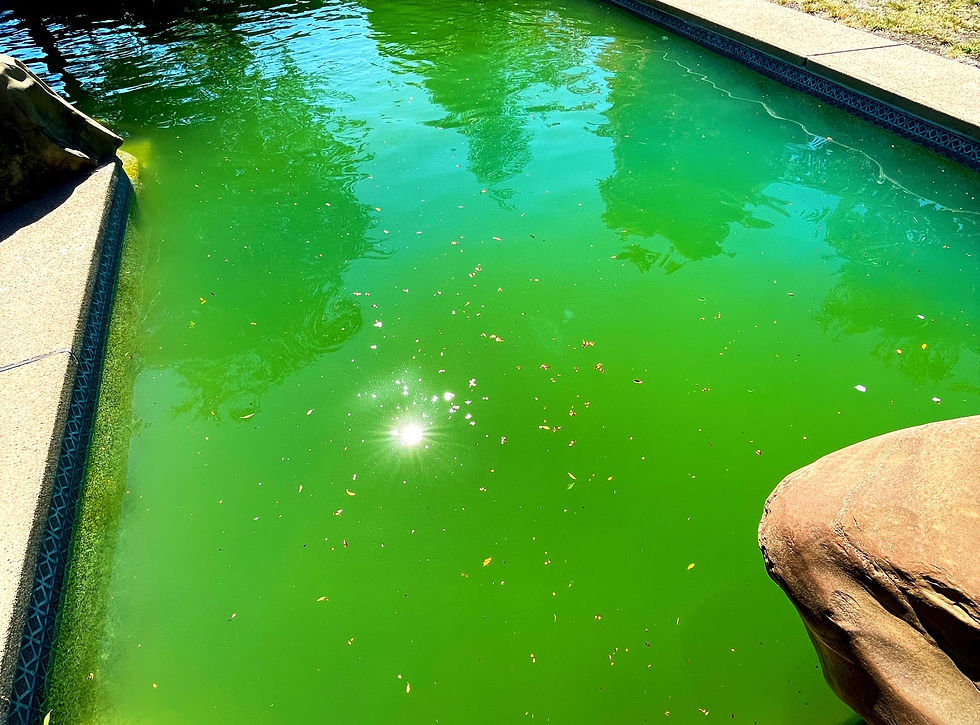The Best Ways To Keep Your Pool Clean: Consistency & Proactiveness
- Sage Leif
- Sep 12, 2023
- 4 min read
Updated: Dec 1, 2023
"We're not swimming, so we won't need your service."I'm going to cover the pool and turn the pump off during winter."Algae don't grow in cold water anyways."
Is Weekly Maintenance Necessary In Winter?
Yes
No
Maybe
I don't Know
"The greatest victory is that which requires no battle." - The Art of War

The enemy is coming for your pool. They are lurking in every crack and crevice, in every corner, patiently waiting and watching. You may not be able to see them but rest assured, they are there.
Did you know that every year, over 3 million people worldwide succumb to water-related diseases? Shockingly, more than 2 million of these victims are children. To put this into perspective, it's akin to a jumbo jet crashing every hour. But what about the situation in the United States? Specifically, what about the quality of swimming pool water?
A study published in 2018 estimated that recreational water activities in the US are linked to a staggering 90 million (90,000,000) illnesses each year, with swimming being a primary contributor to waterborne respiratory, ear, and skin infections. While it's rare, every year there are reported deaths resulting from flesh-eating bacteria due to improperly sanitized pool water. According to the CDC, outbreaks of a gastrointestinal disease called cryptosporidiosis increased by around 13% annually from 2009 to 2017, with swimming accounting for more than 50% of these illnesses. These statistics are undeniably grim.
The issue at hand is that many of these illnesses originate from individuals swimming in chlorinated pools. You see, it's not merely about adding chlorine to the pool and assuming everything is fine. It's a much more intricate process than that.

Just this summer, I personally received over 60 calls regarding pools that had turned completely green. I mean, so green that you could scoop out the algae with your hands. Algae can harbor harmful bacteria that can make you seriously ill. If you observe algae in any form, regardless of the amount, anywhere in your pool, it's already too late. The enemy has already established a foothold. Algae blooms aren't always visible (sometimes referred to as microalgae). A pool may have clear water and a sufficient chlorine reading, yet still develop algae. This algae will start to thrive, multiply, and can even double its population in as little as 3-8 hours. Soon, the water will become cloudy, algae may start growing on steps and walls, and if immediate, drastic action isn't taken, your pool will turn a menacing shade of green. Once it's green, your pool could attract even more unwelcome guests, including bacteria, parasites, and mosquitoes.
In essence, even if your pool water appears pristine and clear, it doesn't mean the enemy isn't present. Once the enemy gains a foothold, it strengthens by the hour.
The issue this year is that many customers either did not have pool service or were not consistent with maintenance during the winter season. This left them with a turbulent, algae-infested summer journey that cost them not only time and effort but also hundreds to thousands of dollars to rectify. You see, during the winter, runoff from rain and debris in the form of dirt and leaves enter the pool. Over time, they break down into phosphates and nitrates. Phosphates serve as a vital food source for living organisms, essentially nourishing the enemy. It's crucial to note that chlorine doesn't eliminate phosphates. The only way to eradicate phosphates is through proactive pool care, which includes the following steps:
1. Remove as much debris as possible, every week.
2. Regularly brush all surfaces.
3. Empty all baskets and bags on a consistent basis.
4. Clean the filter as required.
5. Manage phosphate levels by conducting a thorough purge once per season and adding a maintenance dose each week.
6. Maintain sanitation levels on a weekly basis.
7. Keep the pump on a schedule, ideally 4 hours a day.

I'm frequently asked, "What do you do with pools in the winter? Does your work slow down?" The answer is a resounding no. In fact, winter is my busiest season. While I may not be using as much chlorine, winter brings rain and wind. Rain and wind result in debris entering your pool, which subsequently leads to the formation of phosphates and nitrates. If not removed, debris will end up staining the plaster. Meanwhile, phosphates are the enemy's sustenance, which, in turn, breeds algae. And if there's algae, I've essentially lost a customer. Worse, if that customer decides to swim, they could potentially fall seriously ill. So, during the winter, the enemy puts up a fierce fight, and I'm at the forefront. It's a demanding season; I have to remove as much debris as possible, ensure all baskets are clear (inevitably, there's always a clog to deal with), brush diligently, and, crucially, clean all the filters again. That's why I assert that winter is my busiest period.
Some customers opt to cancel pool service during the winter. However, this approach is counterproductive. In fact, it can lead to significant issues come summer. Summer should be a time for swimming, not struggling to fix your pool. You shouldn't have to fret about whether your pool is adequately sanitized or if the enemy has already infiltrated it. I can't guarantee that the enemy isn't lurking in your pool; they're always present. However, what I can guarantee is their ultimate defeat.
The enemy is relentless in its pursuit of your pool; will you allow it to seize control?
Win the war without fighting the battle. Be proactive.
Recap: The best way to keep your pool clean, is by being consistent and proactive in maintenance.
Stay tuned for the next installment: "How Winter Weather Can Damage Your Pool and Equipment: Preventing Potential Pitfalls."



Comments